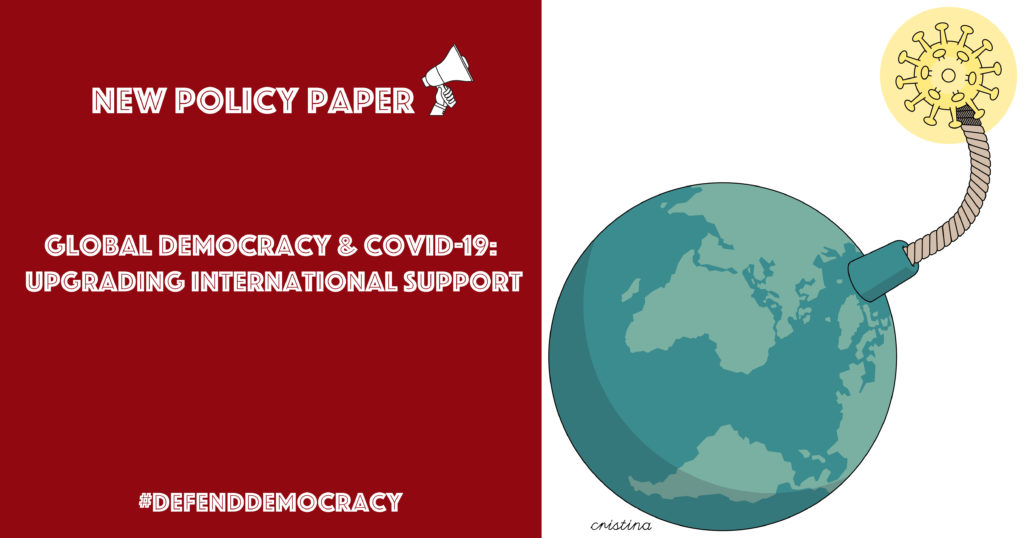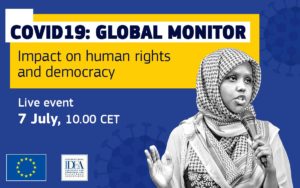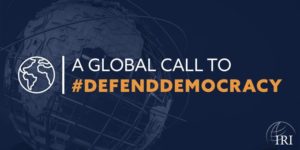
The Covid-19 pandemic is having distinctive political effects across different types of regime, according to a new analysis. Policy responses need to be tailored to contrasting outcomes and risks in the approach and methods they adopt to advance and uphold democratic rights.
Governments are using the Covid pandemic to further curtail democratic activities, says the report, ‘Global Democracy and Covid-19: Upgrading International Support,’ endorsed by 11 pro-democracy groups associated with the recent ‘Call to Defend Democracy.’
 The pandemic has distinctive political implications across different regime-types, the report adds, calling for practical policy initiatives to defend democratic norms in a manner tailored to specific circumstances, including:
The pandemic has distinctive political implications across different regime-types, the report adds, calling for practical policy initiatives to defend democratic norms in a manner tailored to specific circumstances, including:
1) Establishing a comprehensive monitoring mechanism to track restrictive emergency measures, and guide potential international responses
2) Incorporating democracy support into COVID-19 emergency and recovery aid
3) Investing in multilateral cooperation to safeguard democratic norms and practices
4) Providing support to new civic participation initiatives that have emerged as a result of the pandemic
5) Harnessing emergent innovations in democratic participation, such as on-line protests, parliamentary digitalisation and steps to improve accountability mechanisms for oversight of elections, and democratic institutions.
 While certain restrictions can be justified under democratic constitutions, they must be temporary, proportionate, and subject to oversight, the report adds. It is paramount that any extraordinary actions are ended as soon as the crisis period is over.
While certain restrictions can be justified under democratic constitutions, they must be temporary, proportionate, and subject to oversight, the report adds. It is paramount that any extraordinary actions are ended as soon as the crisis period is over.
“Democracy needs to be defended more than ever. Without rising to the challenge, we risk losing fundamental freedoms that we have long taken for granted,” said International IDEA Secretary General Kevin Casas-Zamora.
Organisations endorsing the report include the European Endowment for Democracy, which commissioned the analysis, plus the National Endowment for Democracy, International IDEA, Carter Center, European Partnership for Democracy, European Network of Political Foundations, International Foundation for Electoral Systems (IFES), International Republican Institute, National Democratic Institute, Parliamentary Centre and Westminster Foundation for Democracy. The report can be downloaded here.
 The pandemic and its economic fallout should force governments, civil society and international organizations to finally confront the structural weaknesses of the economies and labor markets that created this precarious new working class, argues Christopher Sabatini, senior research fellow on Latin America at Chatham House. Doing so, though, will require going beyond labor’s hidebound definitions and traditional constituencies to reconceptualize the nature of work today, the working class itself and the obligations of the state to it, he writes for World Politics Review.
The pandemic and its economic fallout should force governments, civil society and international organizations to finally confront the structural weaknesses of the economies and labor markets that created this precarious new working class, argues Christopher Sabatini, senior research fellow on Latin America at Chatham House. Doing so, though, will require going beyond labor’s hidebound definitions and traditional constituencies to reconceptualize the nature of work today, the working class itself and the obligations of the state to it, he writes for World Politics Review.
Input from labor groups like the AFL-CIO, the largest federation of unions in the U.S., is essential to reframing the global conversation on the economy around how the nature of employment has changed, how the lack of organization and representation makes workers more vulnerable, and how the state has an obligation to protect informal workers, adds Sabatini, a former Latin America Program Officer at the National Endowment for Democracy (NED).
Webinar with UN Special Rapporteur Clement Voule
 Don’t forget to register for the online discussion “Civic Space and the Defense of Democracy” with UN Special Rapporteur on the Rights to Freedom of Peaceful Assembly and Association, Clement Voule. Happening this Thursday, July 16 from 9am – 10:30am EDT.
Don’t forget to register for the online discussion “Civic Space and the Defense of Democracy” with UN Special Rapporteur on the Rights to Freedom of Peaceful Assembly and Association, Clement Voule. Happening this Thursday, July 16 from 9am – 10:30am EDT.
The event is co-hosted by the World Movement for Democracy, the Irish Permanent Mission to the United Nations, and Freedom House, along with the Special Rapporteur’s office.
Register here to attend Thursday July 16, 9am to 10:30am NY time (3pm to 4:30pm Geneva time). This webinar is part of a larger series of webinars that the Special Rapporteur will hold from July 14 to July 17. For an overview of the full series, click here.







